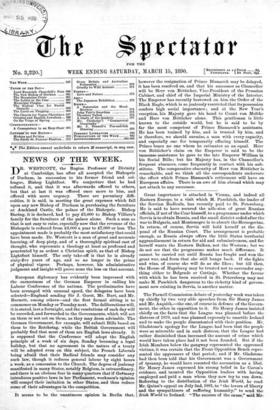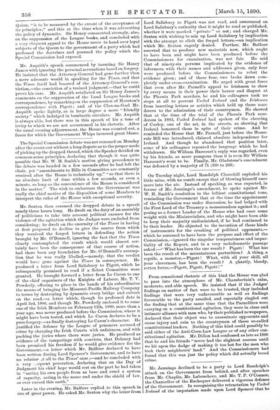The Parnell Commission debate of yesterday week was taken up
chiefly by two very able speeches from Sir Henry James and Mr. Asquith,—the one, of course in defence of the Govern- ment, the other in opposition to it. Sir Henry James insisted chiefly on the facts that the League was planned before the distress of 1879, and was planned expressly to unsettle Ireland and to make the people discontented with their position. Mr, Gladstone's apology for the League had been that the people were so miserable and in such distress, that the League had rather diminished than increased the amount of crime which would have taken place had it not been founded. But if the Irish Members below the gangway represented the oppressed victims, it was certain that the Front Opposition Bench repre- sented the oppressors of that period; and if Mr. Gladstone had then been told that his Government was a Government of tyranny, he would have resented the accusation as a libel. Sir Henry James expressed his strong belief in Le Caron's evidence, and taunted the Opposition leaders with having employed and paid a man whom they now try to run down. Referring to the distribution of the Irish World, he read Mr. Quinn's appeal on July 2nd, 1881, to " the lovers of liberty and the sympathisers of suffering humanity," to send the Irish World to Ireland. " The success of the cause," said Mr.
Quinn, "is to be measured by the extent of the acceptance of its principles ;" and this at the time when it was advocating the policy of dynamite. Sir Henry commented strongly, also, on the suppression of the League books, and concluded with a very eloquent appeal to the House never to hand over loyal subjects of the Queen to the government of a party which had professed the doctrines and pursued the policy which the Special Commission had exposed.







































 Previous page
Previous page